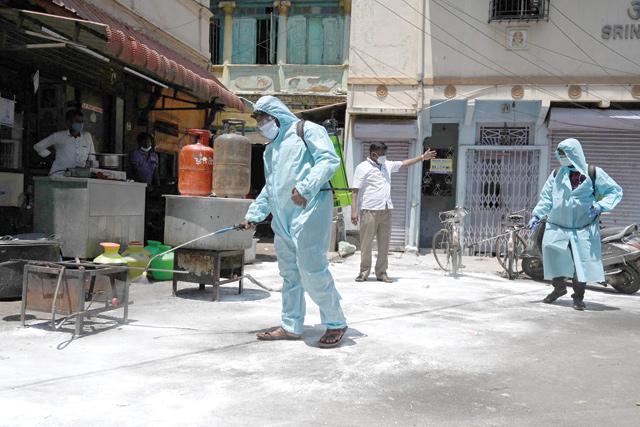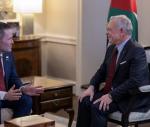You are here
US not trying to 'outdo' world powers in Africa, says Blinken
By AFP - Aug 08,2022 - Last updated at Aug 08,2022

US Secretary of State Antony Blinken (centre), accompanied by South Africa's Foreign Minister Naledi Pandor (left), arrives to deviler a speech on the US-Africa Strategy at the University of Pretoria's Future Africa Campus in Pretoria, on Monday (AFP photo)
PRETORIA — The United States is seeking a "true partnership" with Africa and not trying to "outdo" other world powers in vying for influence on the continent, US Secretary of State Antony Blinken said on Monday.
Blinken arrived in South Africa for an official visit on Sunday during a three-nation African trip which follows hot on the heels of an extensive tour of the continent by Russian Foreign Minister Sergei Lavrov.
Speaking in the South African capital Pretoria on Monday, Blinken said the United States did not see the region as the "latest playing field in a competition between great powers".
"That is fundamentally not how we see it. It's not how we will advance our engagement here," Blinken told a press briefing alongside his local counterpart Naledi Pandor.
"Our commitment to a stronger partnership with Africa is not about trying to outdo anyone else."
For his first stop, the US top diplomat chose South Africa, a leader in the developing world which has remained neutral in the Ukraine war.
Pretoria has refused to join Western calls to condemn Moscow, which had opposed apartheid before the end of white-minority rule in 1994.
"What we seek most of all is a true partnership between the United States and Africa. We don't want an imbalanced or transactional relationship," Blinken said.
Pandor described Russia as a "negligible economic partner" for South Africa but added she was glad the United States was not asking her country to take sides.
However, there had been "a sense of patronising bullying" from other partners in Europe and elsewhere, she said.
New Africa policy
Blinken's comments came ahead of a policy announcement on the US government's new Africa strategy, which the Secretary of State was expected to lay out in a speech at the University of Pretoria on Monday.
White House officials told reporters on Sunday that the new strategy will actively engage the region's leaders on issues from climate change to pandemic recovery to food insecurity, while thinking "more holistically" about military engagement on the continent.
Their comments in a background briefing come at the end of an extended policy review by President Joe Biden’s administration.
Some critics say a US focus on fighting extremist groups in Africa militarily has borne little fruit, even while China and Russia have made continued inroads on the huge continent by aggressively using diplomatic and economic tools.
In its policy paper outlining the new US strategy, the Biden administration argues that a push for greater openness and democracy in sub-Saharan Africa will help “counter harmful activities” by China, Russia and other actors.
The new policy paper suggests that Beijing sees the region as an “arena to challenge the rules-based international order, advance its own narrow commercial and geopolitical interests... and weaken US relations with African peoples and governments”.
It says Russia views the region as a “permissive environment” for actors including “private military companies, often fomenting instability for strategic and financial benefit”.
‘Open season’
Vulnerable countries in Africa and elsewhere in the world have been hard hit by the fallout from the Ukraine war that has sent prices of fuel and food soaring.
Powerhouse South Africa belongs to a group of emerging economies called BRICS.
In June, Russian President Vladimir Putin urged BRICS countries — Brazil, Russia, India, China and South Africa — to cooperate in the face of “selfish actions” from the West.
On Monday, commenting on Russia’s invasion of Ukraine, Blinken said the United States did not seek conflict anywhere but that it was important to stand up to challenges to the international order.
“If we allow a big country to bully a smaller one, to simply invade and take its territory, then it’s going to be open season, not just in Europe, but around the world,” he said.
On tensions with China over Taiwan, Blinken said it was “deeply unfortunate” that Beijing had chosen to suspend cooperation with Washington on issues including climate change.
“That’s not punishing the United States, that’s punishing the entire world,” he said, adding that developing nations, notably in Africa, stood to lose the most.
Related Articles
SOWETO, South Africa — US Secretary of State Antony Blinken kicked off a three-nation African trip on Sunday paying tribute to the Soweto Up
NEW DELHI — Five of the world's biggest emerging economies on Tuesday called for the development and delivery of COVID-19 vaccines to be spe
JOHANNESBURG — Vladimir Putin, who is under an international arrest warrant, will not attend a BRICS nations summit in South Africa next mon
















